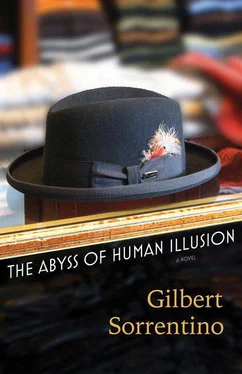Here is a man, placed, when he was but eight years old, into an orphanage by his father, a man overwhelmed by the necessity of raising, alone, three children, while denying, for a year and a half, the fact that his wife had gone totally insane. The boy was selected, so to say, by his father, on what can only be called a whim. And so off he went to the orphanage, while his siblings lived on with their father in the small frame house in Troy. He was more or less ignored by his family, and after a few years, forgotten.
In 1942, he was permitted to leave the orphanage, a year earlier than decreed by law, so that he could join the army, which he discovered to be very much like the orphanage. He fought through Europe with the Second Armored Division of Patton’s Third Army, was wounded three times, and was discharged early in 1945,on points. After holding a job as an assistant manager in a relative’s floor-covering business, he enrolled, for some wholly obscure reason, in a Baltimore art school, and the moment he put a brush to canvas, knew what he was meant to do with his life, his time, with everything. The paint would occult, with color and texture, his family, silently; perhaps even kill them. And so he became a painter.
His relationships with women were ephemeral and unsatisfactory. He wanted to be humiliated, embarrassed, shamed — he wanted to be dominated, but his desires were far removed from the carnal. He wished to be erased. It was, or so he must have thought, all he was good for, as hopeless as he was, as unhappy as he was, as useless as he was. In the orphanage, ignored by his father and his hateful siblings, and unremembered by his crazy mother, he had seen the routine sadisms of the institution as small deliverances. But in the army, through the years of blood and agony and horror, the severed limbs and shit and pus of ceaseless death, he had not even been present enough to be killed, to become another cipher. That he became a good painter, a very good painter, meant, of course, nothing, insofar as his happiness was concerned. He was a very good artist choked with misery.
He could not ask the women who passed through his life to shame and debase him, he had no words to ask these things, and, perhaps, he had no true sense of what he wanted. He did not avail himself of professional women who could have relieved him, for that would have been different, grossly erotic; he needed someone who cared for him, however fragile that caring might have been, to insult and demean him. He wished to be humiliated by a friend; a gentle friend.
Perhaps with the knowledge that he was sublimating his deepest desires, addressing and satisfying them in some vague and peripheral way, or perhaps not, he chose — this was long before he had a regular dealer or gallery — he chose to make a living by working as a waiter. He complained to everyone he knew about how terrible a job it was, how he loathed it, how he would get back to his studio too exhausted to paint (this was not true), how he’d rather do anything else, and so on. But he loved the work, loved being shouted at by the chefs, the head waiters, the bartenders; he loved being treated contemptuously by so many of the diners, whom he thought of as foul, slobbering pigs, their money earning them a place at the expensive trough and the absolute right to insult and harry this cheap-tuxedo-wearing slave, this lackey, this zero. When he watched them eat, his stomach would turn over with nausea, and he would be obscurely delighted that these swine had power over him.
He loved it, he wanted it. He needed it. It was precisely what he was worth, it was all he was worth. It was a wife and a mistress, troops of luscious whores, all of them waiting to carry out his depraved, self-abasing orders. To be humiliated. To be embarrassed. To be shamed and shamed again to the core of his being. To be salvaged at last and forever.
Deny it to himself as he would, his work had begun to bore him. Well, he had been at it for fifty years, a little more, really, than fifty years, if he counted apprentice work; he had a shelf of books to attest to those wearying yet absorbing labors, to those thousands of hours, millions of words, and, he was chagrined to recognize, the slow but absolute fading away of what had at one time been a small but definite critical attention to his books. Fifty years. It was indeed wondrous, so he often thought, that he had managed to live at all, to walk and talk and eat and laugh, to love women, to father children — how had that happened?
Perhaps most unsettling — beyond the nagging sense that he had lived but in his spare time — his books, whenever he took one down at random, out of curiosity or to refresh his memory as to how he had managed a specific formal problem, invariably shocked him in that nothing in any of them seemed in the least familiar, but looked as if — read as if — written by a stranger who had secretly invaded his mind and absorbed large quantities of his memories. Worse still, every book — and there they were, with their familiar titles, with his name on jacket and case — every book seemed too good for his talents, such as they were, such as he considered them to be. Who had written this paragraph? these pages? these chapters? — some of which struck him as so artistically authoritative, so perfect, so sublime, that he felt as if he had plagiarized, word for word, the work of another, much better writer.
And so his current work, beyond its somewhat mischievous, even malign capacity to fill him with an ennui so profound as to exhaust him, appeared to him to cast a shadow on his earlier work, to demean it, sully it, in a sense to sabotage it. With every sentence he wrote, it seemed, an earlier sentence, a glittering and suave sentence, decayed a little. But this was all he knew how to do. He wasn’t much good for anything else, and what he did know how to do — even when, he smiled ruefully — even when he knew how to do it, proved nothing, changed nothing, and spoke to about as many people as one could fit into a small movie theater.
And so he continued to do it, correcting and revising each newly made page with a feeling of weird neutrality, with a feeling that he was simply passing the time: this or solitaire — all right, this. Surely, the other old writers he still knew felt precisely this way. Did they? He surely wouldn’t ask such an impertinent question.
He had recently received a letter from a dear friend, who, it so turned out, died soon after. He took the letter from his files one morning, before he started what he now thought of as “work,” scare quotes flaring, and found in it what he was sure he had read. The friend had confessed to him that his last book was, indeed, his last book, that he had given up or lost — it made little difference — the ability and the desire to write another word. His friend lamented the fix that he was in, but his frustration seemed forced, it seemed a position taken because of proprieties, the old truisms about art: a writer who cannot write, how sad, how tragic. It was a role his friend was playing. So it seemed, so it was.
He sat as his desk, and read the letter again. He wished, oh how he wished it wasn’t so, but he was choked with envy of his friend’s sterility: not to be able to write, not to want to write, to be, as they say, “written out,” or, more wonderfully, “burnt out”—lovely phrase! But it was a gift that had not been given him, and, he knew, despairing, that it would never be given him. He was doomed to blunder through the shadows of this pervasive twilight, until finally, perhaps, he would get said what could never be said.
He’d stopped abusing alcohol years ago, although he disliked the word “abusing,” and used it only with people he didn’t know or didn’t care to know. He thought it a spurious word, a kind of self-help, onward-and-upward, simperingly Christian word that conjured up an image of a frenzied drunk assaulting a bottle of whiskey in a perverse madness. He hadn’t “abused” alcohol, but had spent almost four years sitting in a chair drinking jug wine around the clock and looking, variously, at the wall, the window blind, and the TV screen. Now he was sober and had been for more than five years. What he discovered was that being sober meant no more than being sober: he certainly was no more content, no more serene, nor had he found anything wonderful to fill his “leisure” hours, no God, in whatever costume. He went to work, came home, ate his frozen dinners, drank tomato juice with a lot of tabasco in it, and watched television. He smoked less, but that was because his salary was pitifully low at the prussianly anti-union retail outlet he worked at.
Читать дальше












